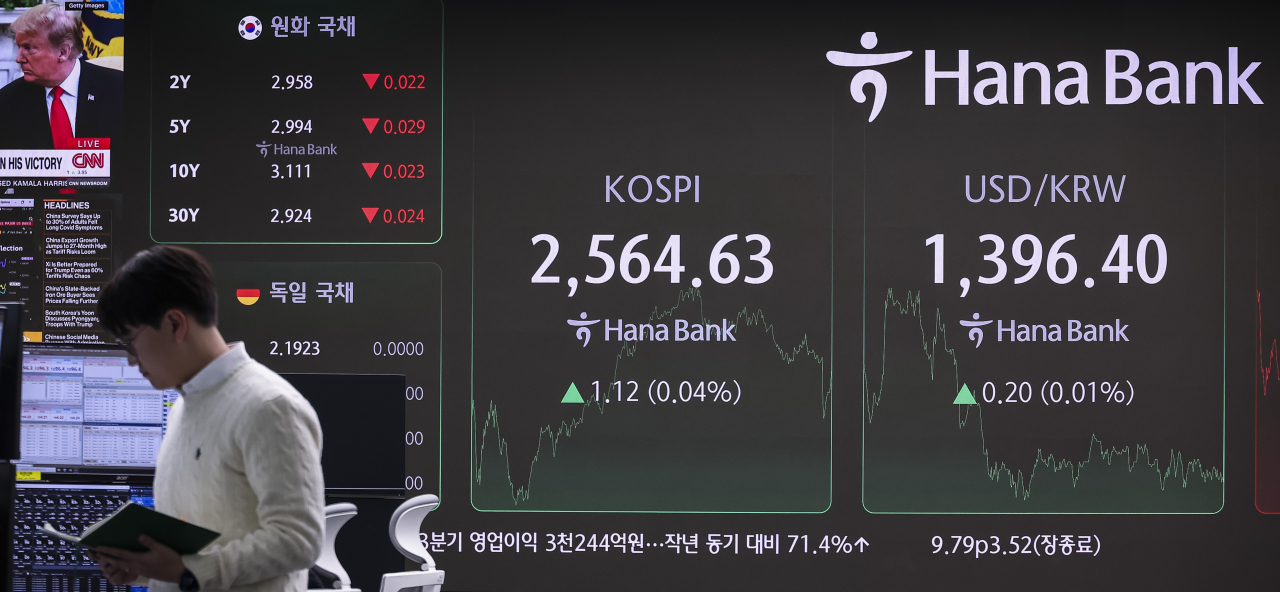 |
An electronic board in a dealing room at the Hana Bank headquarters in Seoul shows the Kospi closing at 2,564.63, up 1.12 points, or 0.04 percent, from the previous day, and the Korean won against the US dollar trading at 1,396.4 won, as the local currency loses 0.2 won during daytime trading hours Thursday. (Yonhap) |
With Donald Trump winning the US presidential election, the “Trump trade” flowed into the South Korean stock market, with shares of defense and shipbuilding firms surging. The value of the local currency against the US dollar dropped to a two-year low.
Shares of defense companies jumped, with investors anticipating robust earnings on the potential for escalated geopolitical risks. Furthermore, Korea could face renewed pressure to pay more in its defense cost-sharing arrangement with the US. The president-elect, referring to the country as a "money machine," has said it would be paying $10 billion a year for the stationing of US Forces Korea.
Shares of Hanwha Systems, the defense arm of Korea's seventh-largest conglomerate Hanwha Group, closed at 21,200 won, up 9.79 percent.
Hanwha Aerospace, another defense unit under Hanwha, gained 4.52 percent and defense firm LIG Nex1 also saw around a 3.66 percent increase in share prices.
Shares of companies in the shipbuilding industry inched up as well on reports that Trump said the US seeks to work with Korea in the industry during a phone call with Korean President Yoon Suk Yeol.
Shares of big-name shipbuilder Hanwha Ocean jumped by 21.76 percent to 33,850 won. HD Hyundai Heavy Industries, and Samsung Heavy Industries stocks each surged by around 15 percent and 9 percent, respectively.
On the other hand, shares of secondary battery and renewable energy companies, which were expected to benefit from the “Harris trade,” referring to Trump’s rival Kamala Harris, experienced a plunge.
Shares of Samsung SDI, a major South Korean battery maker, closed at 288,000 won, inching down 3.52 percent.
LG Energy Solution and LG Chem saw around a 1 percent drop in their stock prices as well.
The value of the Korean won against the US dollar continued to fluctuate around 1,400 won as the greenback gained strength.
The local currency against the US dollar was trading at 1,397.2 won as of 5:30 p.m., recovering slightly from its overnight low of 1,404 won.
The Korean won weakened to above 1,400 won per dollar on Wednesday as Trump took the lead in the election. It was the first time the exchange rate rose above 1,400 won in seven months. The Korean currency is at its weakest level in two years, since it reached 1,413.5 won in November 2022.
The won-dollar exchange rate has weakened beyond 1,400 won three times previously, during the financial crises of 1997-1998 and 2008-2009, and amid the US Federal Reserve's aggressive monetary tightening in late 2022.
“With the actualization of the ‘red wave,’ which had not been fully reflected in the market, the US dollar will remain strong for the short term,” Lee Min-hyuk, a researcher at KB Kookmin Bank, said. “The (won could weaken) to as much as 1,420 won.”
Meanwhile, though Trump’s win also ignited a cryptocurrency frenzy, sending the price of bitcoin to a record high, the trading price in Korea has yet to reach its previous record as of press time. According to Upbit, the largest crypto exchange in Korea, bitcoin continued fluctuating at around 103 million won as of 5:30 p.m. It soared to as high as 104 million in the early hours, nearing its record high of 105 million won.







